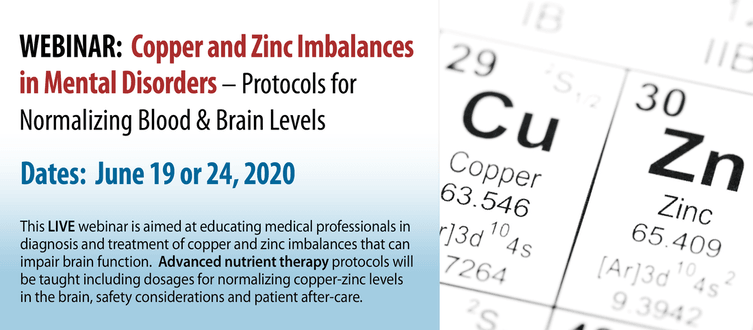Copper and Zinc Imbalances in Mental Disorders
Dr. William J. Walsh, an internationally recognized expert on biochemical imbalances is offering an educational webinar – Copper and Zinc Imbalances in Mental Disorders: Protocols for Normalizing Blood & Brain Levels. This is an important opportunity to learn how to diagnose and treat copper and zinc imbalances that impair brain function.
This two-hour interactive LIVE webinar will cover:
- The Role of Zinc and Copper in Behavior Disorders, ADHD, Anxiety, Depression, and Other Brain Disorders
- Symptoms and Traits of Zinc Depletion and Copper Overload
- Interpretation of Laboratory Results (Copper Serum, Zinc Plasma & Ceruloplasmin)
- Advanced Nutrient Therapy Protocols
- Clinical Outcome Studies
BONUS: A 25+ page Copper-Zinc Reference Document which includes dosages for normalizing copper-zinc levels, safety considerations and patient after-care.
The two-hour interactive webinar is being offered on two dates: Friday, June 19 at 11:00 a.m. CDT and Wednesday, June 24th at 7:00 p.m. CDT.
⟶ Click here to register and to learn more!
Dr. William Walsh’s massive database of 30,000 patients indicates that copper and zinc imbalances are very common in mental disorders, and normalization of these factors usually provides great improvements. Mainstream medicine needs to become more aware of the importance of these trace metals in physical and mental health. The clinical challenge is to identify patients with Copper and/or Zinc imbalances, and to provide treatments that normalize blood and brain levels.
Based on Dr. Walsh’s studies of 2,800 depressed patients, copper overload tends to be more common in women (96% of subjects) and are more likely to suffer from high anxiety, adrenal fatigue, fibromyalgia or postpartum depression in their child bearing years. A large study by William Walsh and John Crayton reported that depressed women with a history of postpartum depression have significantly elevated serum copper when compared to both non-depressed women.
Another outcome study revealed that 75% of young males with ADD, episodic rage disorder, hyperactivity, destructive and/or assaultive behaviors exhibitor exhibited elevated copper/zinc ratios. Separate outcome studies indicated significant improvements in behavior after normalization of Cu/Zn ratios.
Unfortunately, many persons have a genetic inability to regulate copper levels and a serious copper overload can result. Causes of copper overload range from metallothionein SNP mutations, zinc deficiency, environmental copper exposures, copper-rich foods, birth control pills or copper IUDs, and hormonal therapy.
Incidence of Copper Overload:
- Postpartum Depression: 95%*
- ADHD: 68%
- Anxiety: 60%
- Behavior Disorders: 55%
- Schizophrenia: 50%**
- Depression: 32%
- General Population: 20%
This is going to be such an eye opening event. Dr. Walsh is truly one of my go-to resources. Here’s the link to attend.
Please feel free to share this information with your community of healthcare practitioners.
In health,

Resources:
*Crayton JW, Walsh WJ. PubMed 17317521.
**Pfeiffer CC (1976). Mental and Elemental Nutrients. Keats Publishing New Canaan, NY.









